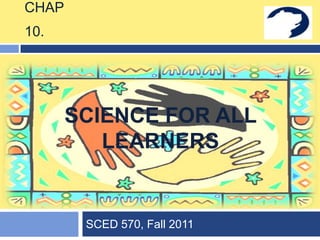
Chapter 10 science for all
- 1. CHAP 10. SCIENCE FOR ALL LEARNERS SCED 570, Fall 2011
- 2. Science for all learners: NSES SCIENCE IS FOR ALL STUDENTS. This principle is one of equity and excellence. Science in our schools must be for all students: All students, regardless of age, sex, cultural or ethnic background, disabilities, aspirations, or interest and motivation in science, should have the opportunity to attain high levels of scientific literacy. The Standards assume the inclusion of all students in challenging science learning opportunities and define levels of understanding and abilities that all should develop. They emphatically reject any situation in science education where some people—for example, members of certain populations—are discouraged from pursuing science and excluded from opportunities to learn science. Excellence in science education embodies the ideal that all students can achieve understanding of science if they are given the opportunity. … students will achieve the outcomes at different rates, some sooner than others. But all should have opportunities in the form of multiple experiences over several years to develop the understanding associated with the Standards. (p. 20)
- 3. Science for all learners 1. Students with disabilities 2. Science for gifted and talented students 3. Science for students from linguistically and culturally diverse backgrounds
- 4. 1. Science for students with disabilities Students with specific learning disabilities Students with mental retardation Students with emotional/behavioral disorders Students with visual impairments Students with hearing impairments Use Individualized Education Plans (IEPS)
- 5. 2. Science for gifted and talented students Possess above average intelligence and unusual skills, interest, talents, and attitudes about learning. Enjoy being challenged with meaningful enrichment activities. Provide a different kind of challenge for teachers.
- 6. 3. Science for students from linguistically and culturally diverse What does it mean by children form “culturally diverse” backgrounds? What is a definition of “culture”? What it is : What it is not: •Dynamic, neither fixed nor •Mere artifacts or material used by a static people •A continuous and cumulative •A “laundry list” of traits and facts process •Biological traits such as race •Learned and shared by a •The ideal and romantic heritage of a people people as seen through •Behavior and values exhibited music, dance, holidays, etc. by a people •Higher class status derived form a •Creative and meaningful to our knowledge of the lives arts, manners, literature, etc. •Symbolically represented •Something to be bought, sold, or through language and people passed out
- 7. English Language Learners (ELL) Increasing ELLs in American schools. Inquiry and hands-on activities help ELLs span the gap between their past experiences and the development of language. Sheltered Instruction Model Minimum dependency on language Concept + language development Non-language cues and prompts => What would be good teaching strategies
- 8. Mapping English-language learners http://datacenter.kidscount.org/data/bystate/Map.aspx?state=CO&loct=5&map_colors =Solid&dtm=8058&ind=3857&tf=133
- 9. Culture and Science Education School science is shaped by culture. Students’ perspective about science and scientists. Gender issues in science education. Multicultural Science Education (NSTA) => http://www.nsta.org/about/positions.aspx